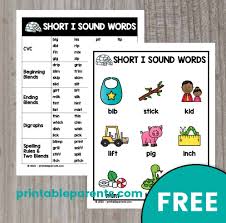Exploring Words with the Short ‘I’ Sound
When it comes to learning and mastering phonics, understanding the short vowel sounds is essential, particularly for early readers. The short ‘I’ sound is one of the most common and easiest sounds for children to recognize and produce. In this article, we’ll delve into the world of short ‘I’ words, provide examples, and offer tips on how to effectively teach and practice these words with young learners.
What is the Short ‘I’ Sound?
The short ‘I’ sound, often represented by the phonetic symbol (ĭ), is a quick, relaxed sound made by slightly raising the tongue in the middle of the mouth.
It’s the sound you hear in words like “sit,” “pin,” and “win.” The key characteristic of the short ‘I’ is that it’s a brief and simple vowel sound, unlike the elongated ‘I’ sound found in words like “ice” or “kite.”
Common Words with the Short ‘I’ Sound
Here are some basic words that contain the short ‘I’ sound, which are perfect for beginning readers:
- Pin – A small, pointed piece of metal used for fastening.
- Sit – To rest on the lower part of your body with your weight on your buttocks.
- Win – To achieve victory in a competition or game.
- Lip – The edge of the mouth, where the upper and lower parts meet.
- Fix – To repair or make something right.
These words are simple, familiar, and useful in everyday language, making them excellent for teaching the short ‘I’ sound.
Tips for Teaching the Short ‘I’ Sound
- Start with Simple Words: Begin with short, three-letter words (CVC words) like “sit,” “pin,” and “lip.” These words are easy to sound out and help children grasp the short ‘I’ sound quickly.
- Use Visual Aids: Show pictures of objects that correspond with the words. This visual association helps reinforce the sound and meaning of the word. For example, showing a picture of a fish while saying the word “fish” helps connect the sound with the image.
- Practice with Rhyming Words: Rhyming words are a fun way to help children recognize and remember the short ‘I’ sound. Create lists of rhyming words such as “sit,” “bit,” “kit,” and “hit,” and practice them together.
- Incorporate Short ‘I’ Activities: Engage children with activities like word matching, flashcards, or phonics games that focus on short ‘I’ words. These interactive methods make learning enjoyable and effective.
- Read Short Vowel Books: There are many decodable books that focus on short vowel sounds, including the short ‘I.’ These books use repetitive short vowel patterns to help reinforce the sound in a meaningful context.
Expanding Vocabulary with Short ‘I’ Words
As children become more comfortable with basic short ‘I’ words, introduce them to more complex words that still contain the short ‘I’ sound. Examples include:
- Flip – To turn something over quickly.
- Miss – To fail to hit, reach, or notice something.
- List – A series of items written or printed consecutively.
- Fish – An aquatic creature with gills and fins.
- Spin – To turn or whirl around quickly.
These words add variety to a child’s vocabulary and challenge their decoding skills as they progress in their reading journey.
Conclusion
The short ‘I’ sound is foundational for young readers, and mastering it opens the door to a wide array of vocabulary. By focusing on simple, recognizable words and using engaging teaching methods, you can help children confidently learn and apply this essential phonetic sound. Whether through practice, rhyming, or reading, the journey to mastering the short ‘I’ is a significant step in the path to literacy.




